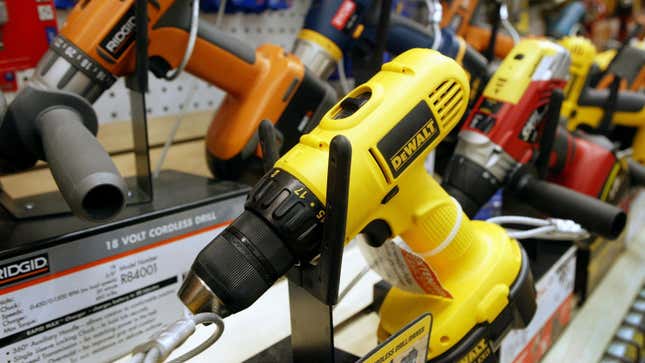
In a bid to crack down on organized retail crime, Home Depot is piloting a program where power tools must be activated via Bluetooth at checkout—or they won’t work. It’s a clever solution to deter theft, but it also highlights how technology can sometimes change gadget ownership in unintended ways.
Apparently, power tools are an attractive and lucrative target for retail shoplifters. Earlier this year, a Florida man stole more than $17,000 worth of power tools from various Home Depot stores in the state. A MarketWatch report notes that the Bluetooth tech is on the device itself, not the packaging, so even if a thief was successful in filching the tool, it wouldn’t turn on. Home Depot is also working with other partners on the program and may extend it to other items like smart home gadgets. Business Insider reports that Home Depot has already tested this tech in a few stores, and will now be rolling it out more widely with the aim of eventually introducing it to every Home Depot in the U.S.
The thinking behind adding the extra step of Bluetooth activation is it turns items with a high resale value from an “easy score” to something more troublesome. The other added benefit is Home Depot can avoid having to keep these items in locked display cases.
There’s no denying that retail theft is a problem. A 2020 National Retail Federation survey found organized retail crime costs more than $700,000 per $1 billion in sales.
However, adding connectivity to devices often opens the door to some unintended consequences. For starters, a lot will depend on how sophisticated this method is—and how easy it is to crack. As Hackaday points out, this is pretty pointless if it can be dismantled by a large magnet. It sounds like Home Depot is hoping the inconvenience is what deters criminals—but when has that ever stopped them from finding ways around built-in security measures? More worryingly, it also raises the question of what happens if and when a legitimate customer decides to resell a power tool? Does that then mean you have to transfer registration or risk bricking your device?
This calls to mind the time Sonos offered discounts to customers trading in older devices. To take advantage of the recycling program, users would have to completely brick their devices before dropping them off at an e-waste recycling center. At the time, Sonos said the move was meant to protect their customers’ security, but it actually ended up forcing recycling centers to strip perfectly useable hardware as they could no longer be refurbished and resold. Sonos later backtracked on the policy after customer backlash.
What Home Depot’s doing here isn’t an exact 1:1, but it is similar in that adds new restrictions to what was previously a simple transaction. Right now, there are a lot of unanswered questions should this pilot program turn out to be successful. For instance, does this only apply to tools bought in brick-and-mortar shops, or does it also affect tools bought online? If so, does that mean you have to go out of your way to go to a Home Depot to activate something you bought online? (Ideally not, because you have to complete a transaction before an online order is shipped to you.) On the one hand, it may help in preventing stolen items from being re-sold online to unsuspecting consumers. On the other, it could end up like HP’s disastrous “free ink for life” plan, or when the company added security chips to cartridges in a bid to prevent consumers from using cheaper third-party options.
Pilot programs don’t always work out, or if they do, the end result might look dramatically different. However, there are reasons for consumers to be wary. We’ve seen this play out before. Companies introduce this kind of mechanism in the name of security, only for it to turn into a subscription-based model that limits options a few years down the line. It’s too early to tell, but usually adding “smart” functions to previously dumb devices is a gateway for planned obsolescence. It doesn’t have to end that way, and hopefully, Home Depot’s pilot program avoids this trap. After all, the last thing anyone wants is permission to use power tools they supposedly paid to “own.”